Easy Lemon Tahini Sauce (With Recipe Variations)
This luscious lemon tahini sauce is super creamy yet light and airy. It is also quick and easy to make. Serve the tangy vegan tahini sauce with falafel, roasted veggies, grain salads, or as a Middle Eastern-style dip for crudités.
This easy lemon tahini sauce is the ultimate sauce for falafel. But it is so much more versatile than that! Serve it with any Middle Eastern or Mediterranean dishes, use it as a dip, or add it to your next mezze spread.
The homemade tahini sauce is light and airy with a creamy texture and luscious lemon flavour. And it happens to be dairy-free, gluten-free, nut-free, oil-free and naturally plant-based.
This simplified version of Michael Solomonov’s tahini sauce relies on fresh lemon juice to mellow the garlic flavours. And it delivers perfectly creamy tahini sauce every time.
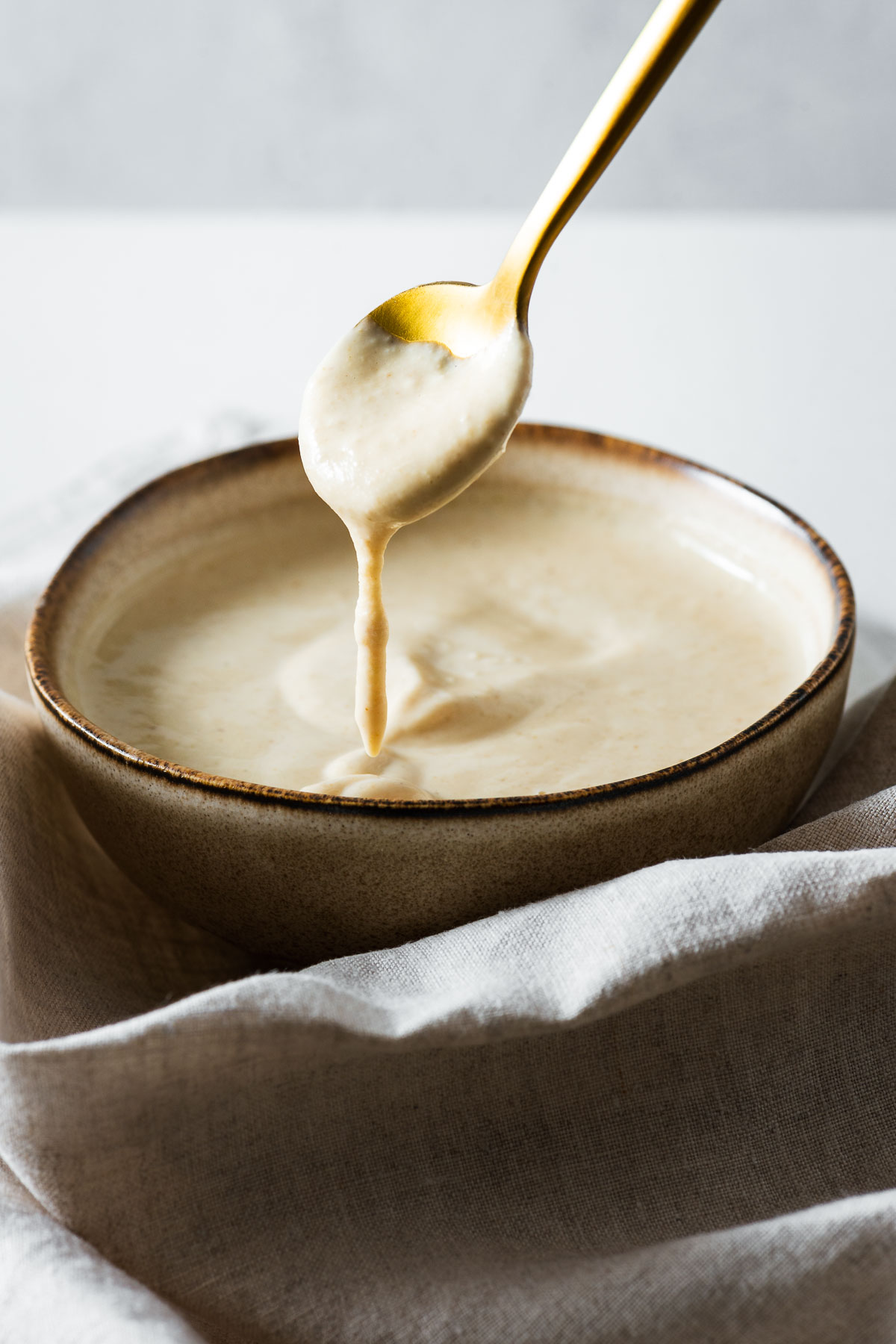
What is tahini?
Tahini is a ground sesame paste made from hulled white sesame seeds. It has a mild, nutty taste and a creamy texture.
Buy the best quality tahini for the best lemon tahini sauce. And be sure it says tahini on the label. Tahini may be sesame paste, but all sesame paste is not tahini. Read more about the difference between tahini and Chinese sesame paste.
If you can’t find tahini in the grocery store, it is easy to make tahini at home.
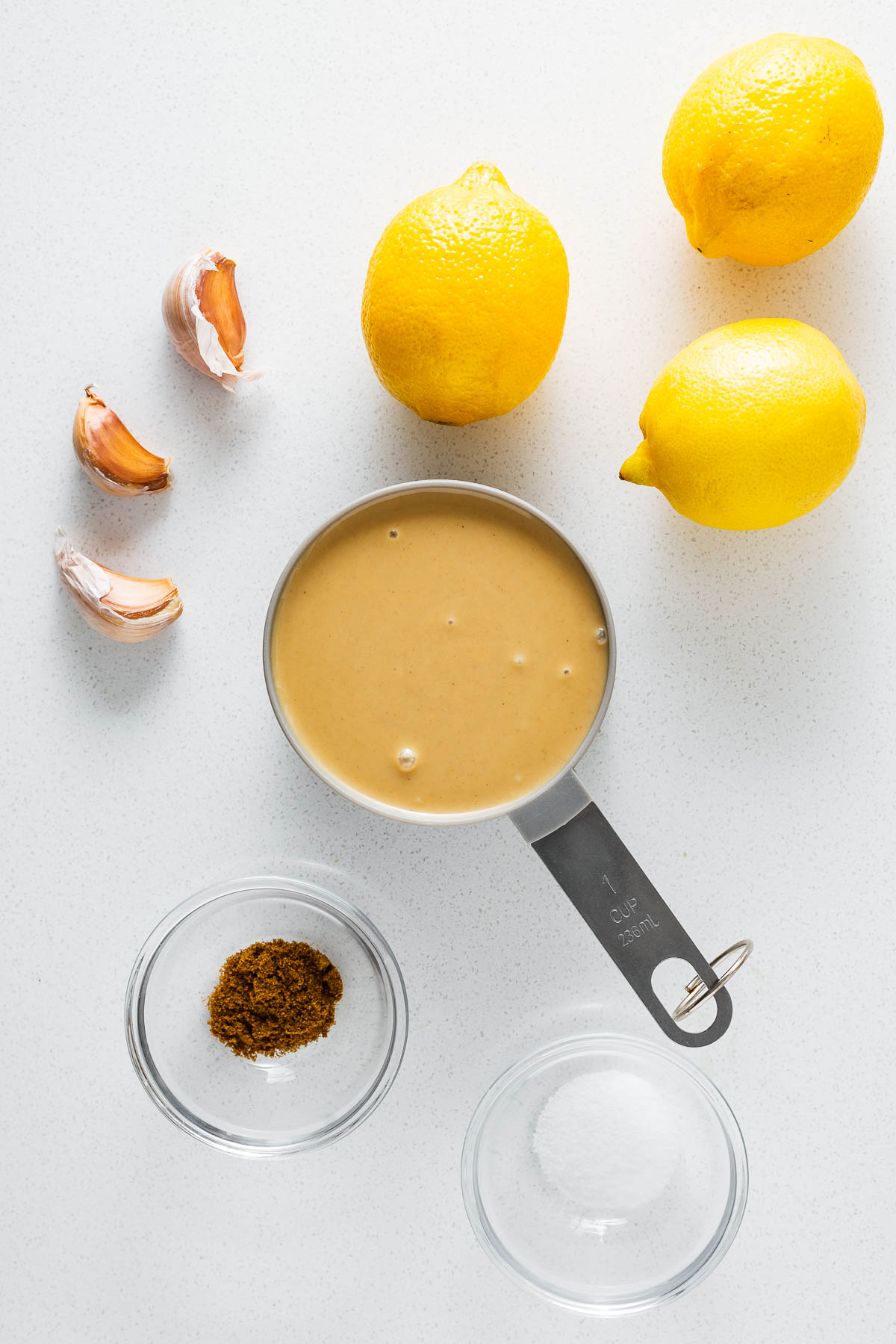
Ingredients and Substitutes
If you hang out here often, you know I adore citrus. And this luscious lemon sauce has everything a citrus lover desires.
As with any recipe using such simple ingredients, quality is essential.
- Garlic cloves: I grate three fresh garlic cloves with a Microplane, but you can use the smallest side of your box grater too. Alternatively, finely chop the garlic or blitz it into the lemon juice with a blender.
- Lemon juice: Use freshly squeezed lemon juice for the freshest lemon flavour. Or use the salty lemon brine from preserved lemons (use half the amount of fresh lemon juice and omit the salt).
- Ground cumin: The ground spice adds an earthy flavour that complements the tahini. But you can omit it if you prefer. Or instead, sprinkle the sauce with za’atar before serving.
- Tahini paste: Use good quality tahini. Check the label and ingredients list. It should be tahini (or tahina) made from only ground sesame seeds. I always look for Israeli tahini. But you can make homemade tahini from hulled sesame seeds using a food processor or high-speed blender.
- Cold water: Adding the water a little at a time, and mixing thoroughly between additions, results in the creamiest tahini sauce. It is ridiculously light and incredibly smooth.
- Sea salt: Use the salt you have on hand. I use about a teaspoon of ground sea salt or kosher salt. Taste and adjust it to your liking.
Tip: When you squeeze a lemon for its juice, zest it first. You can dry lemon zest in the oven or leave it in a sunny spot for a few days. Dried lemon zest is a very convenient and versatile ingredient.
Michael Solomonov’s tahini sauce
Kenji López-Alt first introduced me to Solomonov’s amazing tahini sauce via serious eats.
He strains a blended mix of whole garlic cloves and lemon juice through a fine mesh strainer. And after the tahini, he adds ice cold water, a little bit at a time.
The result is a light, creamy tahini sauce with surprisingly mellow garlic flavours and gorgeous citrus notes.
If you have the time (and don’t mind the extra washing up), go ahead and use Michael Solomonov’s method. I include instructions in the recipe card note and step-by-step instructions.
But by finely grating the garlic, we can recreate the mellow garlic flavour and light creamy texture without requiring extra equipment. And without wasting the garlic pulp.
How to make lemon tahini sauce
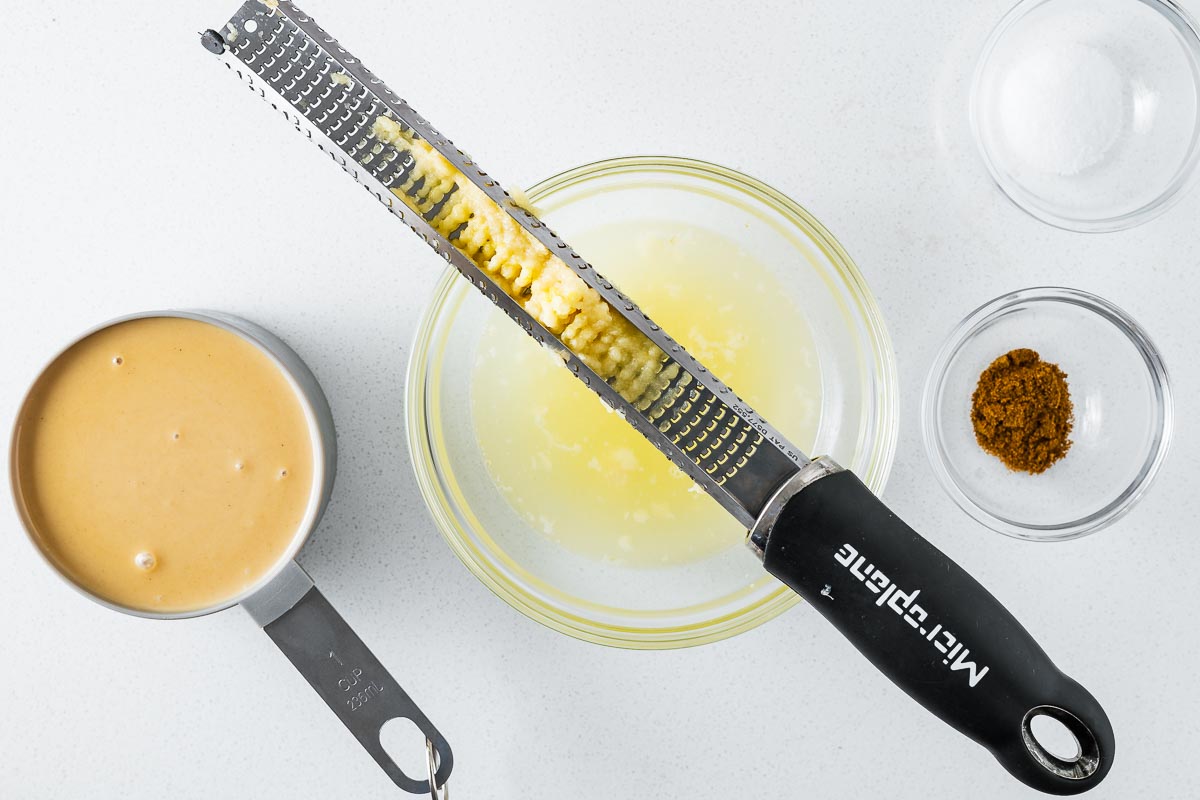
Step 1: Prepare your ingredients. Squeeze the juice from about three to four lemons into a medium bowl. You need half a cup of fresh lemon juice (or a bit more if you want it super lemony).
Finely grate three peeled cloves of garlic into the lemon juice. If you don’t have a microplane, use finely chopped garlic.
Alternative instructions for Solomonov’s method:
If you have a blender or immersion blender – and you don’t mind the additional straining step. Use a whole head of garlic (roughly 20 cloves).
Add the unpeeled garlic cloves to a blender with ⅔ cup of lemon juice.
Briefly pulse the garlic and lemon juice in a blender until you have a coarse paste.
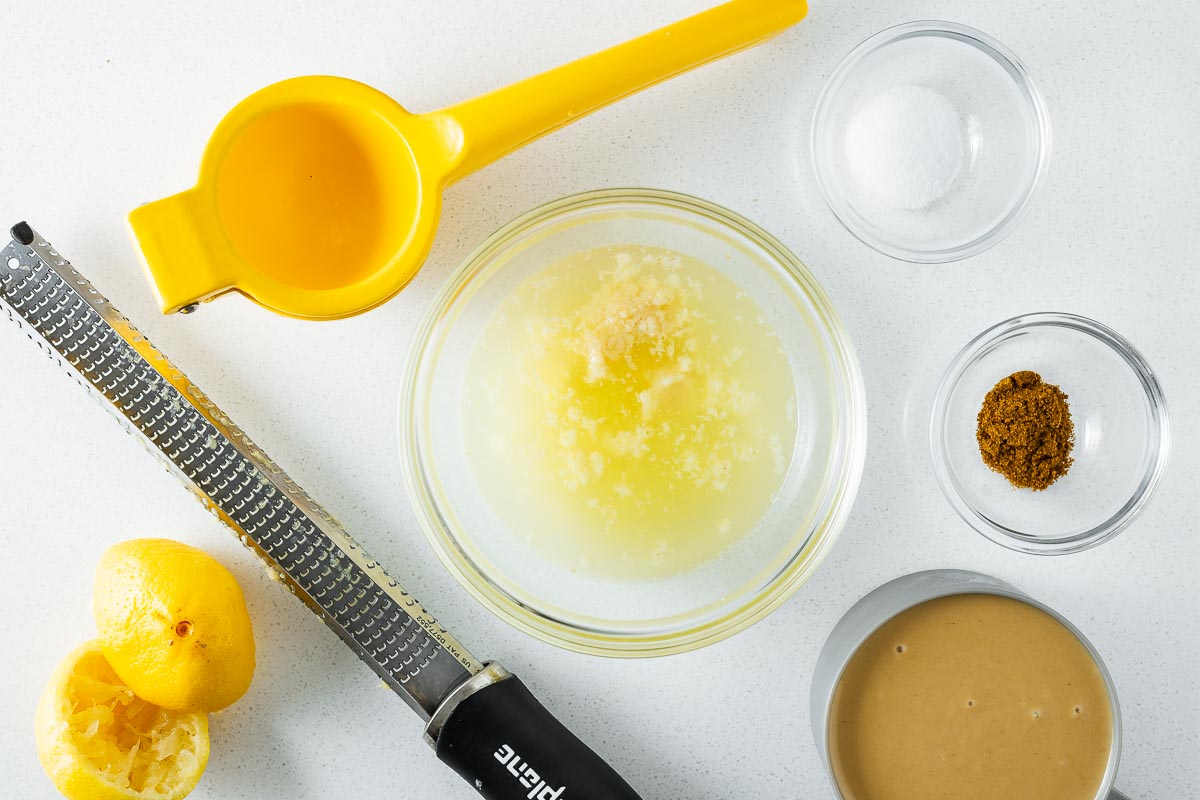
Step 2: Add the garlic to the lemon juice. Let it rest for at least 10 minutes. The acidic lemon juice allows the pungent garlic flavours to mellow.
Alternative instructions for Solomonov’s method:
After resting the garlic for 10 minutes, push the lemony garlic paste through a fine mesh strainer. And discard the garlic pulp that remains in the strainer.
Continue with the recipe.
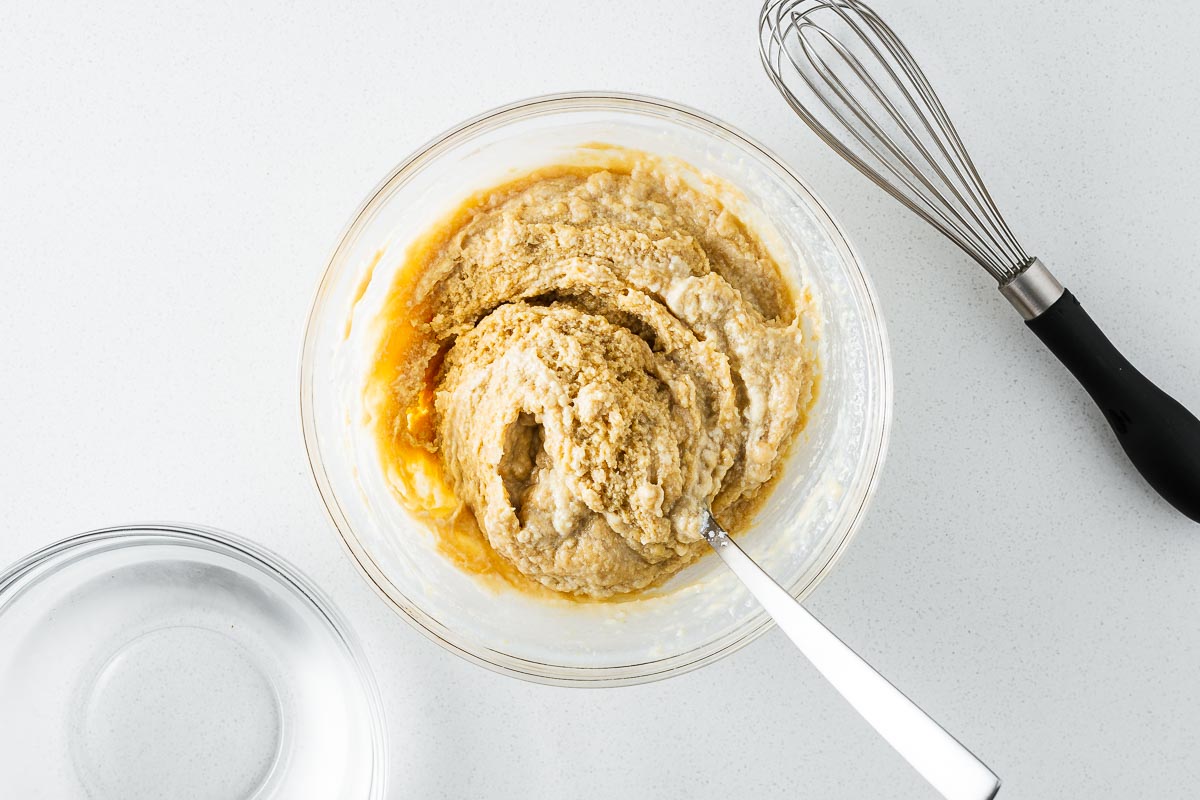
Step 3: Add the tahini. Grab a large mixing bowl and add the garlicky lemon juice and tahini. Use a fork to combine the ingredients. The mixture will seize up and turn thick and stodgy.
Don’t worry. The sauce will turn creamy in the next step!
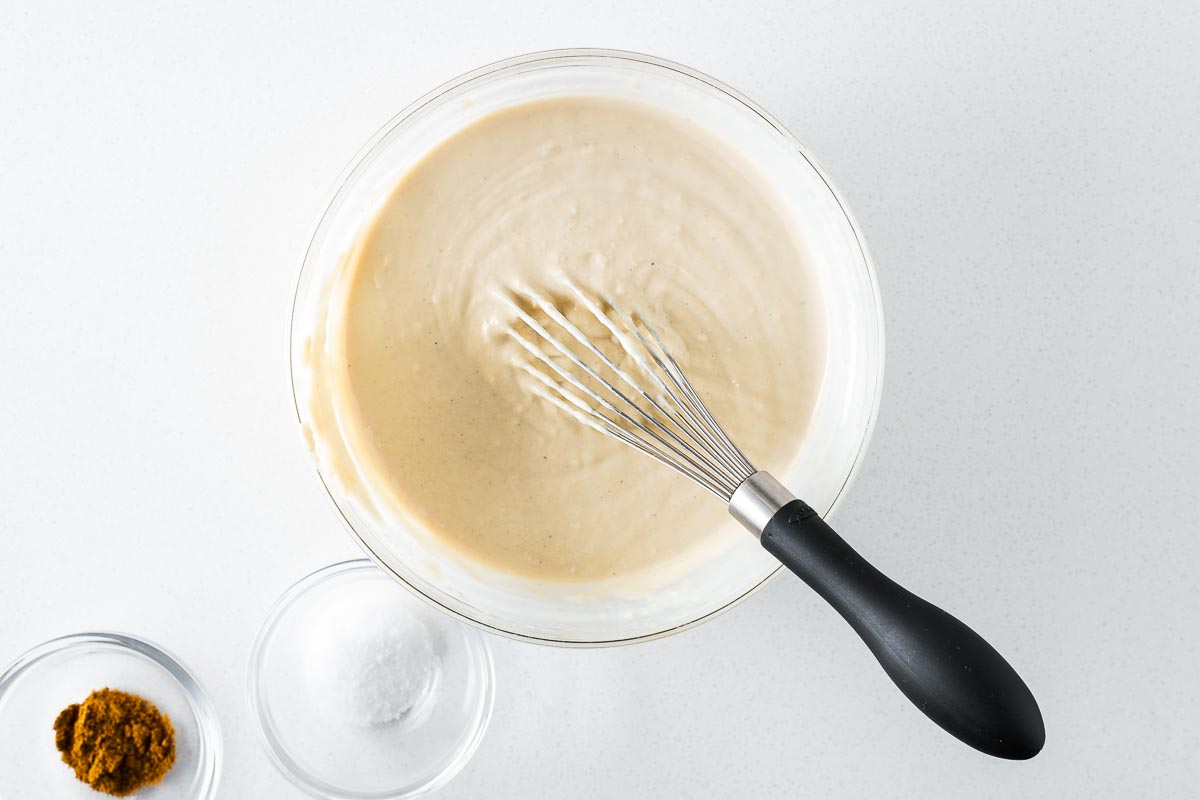
Step 4: Add the water, two tablespoons at a time, stirring with the fork between each addition. Once the sauce loosens, swap the fork for a whisk.
Keep adding water two tablespoons at a time, whisking the sauce between each addition. The sauce will turn smooth and creamy.
You don’t need to add all of the water. Stop once the tahini sauce reaches the desired consistency. Half a cup of water works perfectly for my tahini but you may need less water.
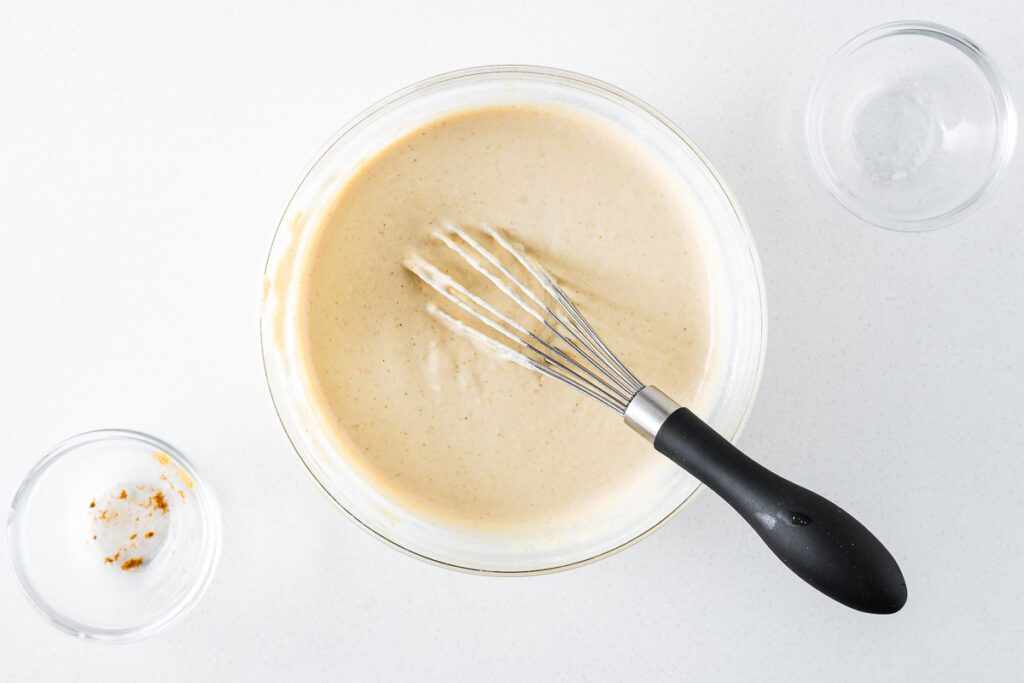
Step 5: Season to taste. Whisk in the ground cumin and taste the sauce before adding salt. I add a teaspoon of sea salt or kosher salt.
Storage
Transfer the creamy sauce to an airtight container and store it in the fridge for up to five days.
I love to make a double batch for meal prep. The flavour of the lemon garlic tahini sauce continues to develop as it sits.
And I haven’t tried freezing the sauce because I use it up too quickly! Let me know in the comments if you freeze yours!
Tips for the best tahini sauce
- Stir your tahini in the jar before you measure it out. Proper tahini contains only sesame seeds, and separation will occur in the jar.
- Don’t skip the resting time. The acidic lemon juice gets rid of the pungent garlic flavours. Instead, it infuses the sauce with mellow garlic notes.
- Start by mixing the ingredients with a fork and switch to a whisk once the sauce loosens. The solid particles in the tahini stick together because they are attracted to the water in lemon juice. It causes the mixture to seize and turn into a stodgy, difficult-to-whisk, paste.
- Add the water a little bit at a time. Once there is enough water, the solid particles can freely slide past each other. The seized sauce relaxes and turns into a creamy emulsion.
Tasty Recipe Variations
I love this easy tahini sauce. But once you have the basic tahini sauce method down, there is so much room for experimenting.
Why not try?
- Green tahini sauce: Add a large handful of fresh herbs like parsley, cilantro and mint. Then process in a food processor for a fresh lemon herb tahini sauce.
- Preserved lemon tahini sauce: Swap the fresh lemon juice for preserved lemon brine (the liquid left behind when you remove all the preserved lemons). Or use preserved lemon puree. Use a quarter cup of preserved lemon brine or puree to substitute the half cup of lemon juice. Taste the lemon tahini sauce before you add more salt.
- Harissa tahini sauce: Spice up this lemon tahini sauce with a tablespoon of rose harissa paste (or your favourite harissa paste). The sauce turns a beautiful pink hue with a fragrant, spicy harissa kick.
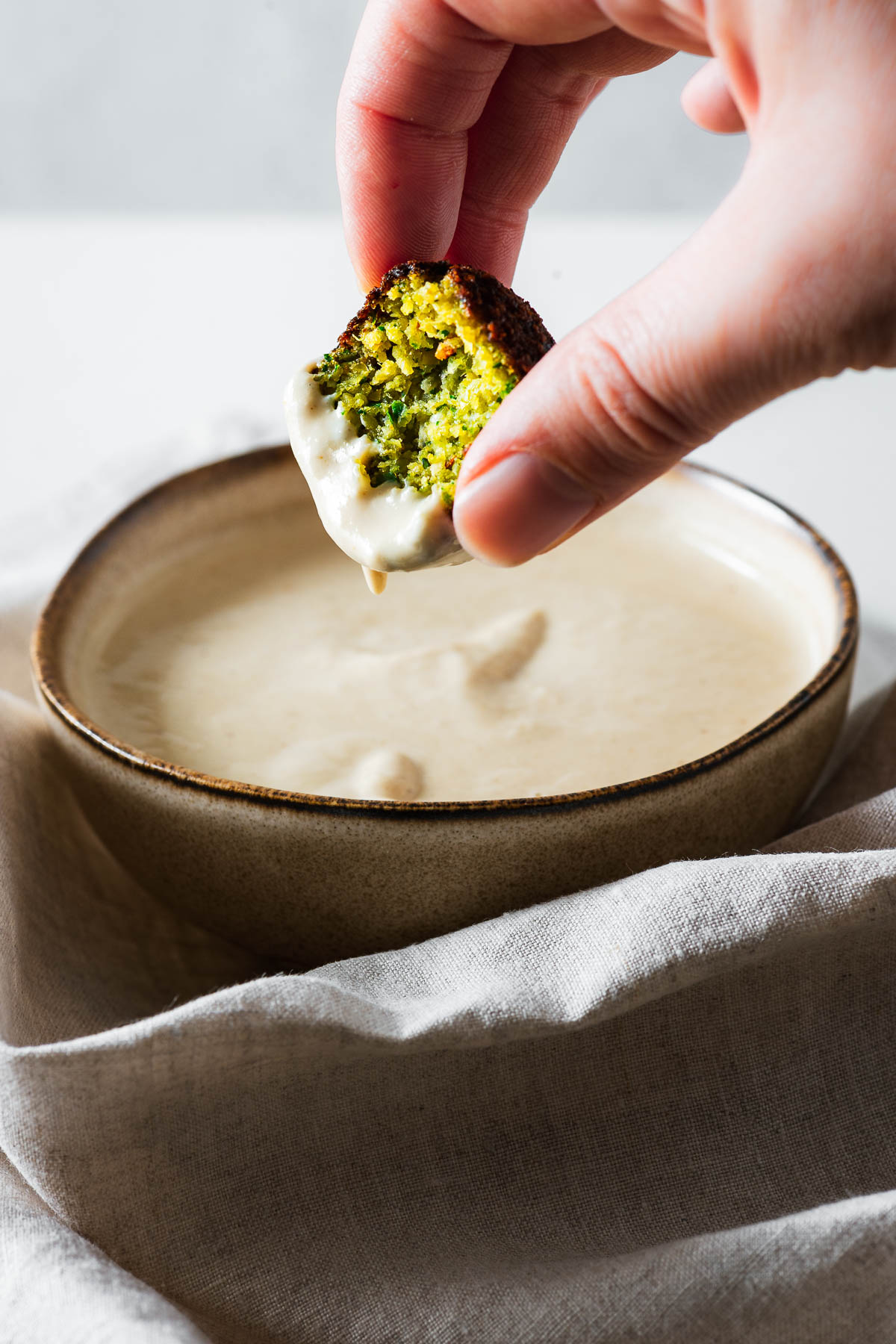
Serving suggestions
This tahini sauce adds a flavour burst to any Middle Eastern or Mediterranean dish. Make a double batch of the lemon tahini sauce to boost healthy midweek dinners.
It is, of course, delicious over grilled meat and fish. But you can also use it to boost roasted vegetables or salads.
Here are some lemon tahini sauce serving suggestions:
- Middle Eastern falafel: It is the ultimate falafel sauce. Drizzle it over falafel pitas or use it as a dipping sauce for crispy Middle Eastern falafel. You can also make convenient baked falafel using canned chickpeas.
- Grain Bowls: Whisk in water or extra virgin olive oil until you have a salad dressing consistency. Use your lemon tahini dressing in this bulgur wheat salad with tahini, or generously poor lemon tahini dressing over quinoa kale chickpea salad.
- Roasted vegetables: Lemon tahini sauce is the perfect accompaniment to roasted eggplant wedges, oven-roasted sweet potatoes, charred broccolini, harissa roasted cauliflower or shawarma-spiced roasted cauliflower.
- Cold salads: Use it instead of mayonnaise for healthy potato or egg salads. Or drizzle it over a no-mayo herbed potato salad.
- Middle Eastern salads: Use it as a salad dressing for Israeli-style tahini salad. Or add it to fresh salads like fattoush, tabouleh or this Arabic chopped salad.
- Tahini Dip: Serve it as a dipping sauce for fritters or fresh crudités.
- Mezze: Try it as part of a mezze spread alongside creamy lemony hummus, labneh (strained yoghurt cheese) and spicy Middle Eastern sauces like zhoug or shatta.
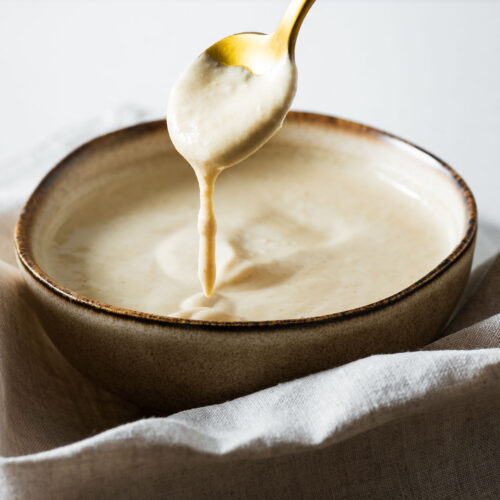
Ingredients
- 3 garlic cloves, peeled and grated*
- ½ cup fresh lemon juice, from about 3 lemons
- 1 cup tahini paste
- ½ cup cold water, more as needed
- ½ teaspoon ground cumin
- 1 teaspoon sea salt, or to taste
Instructions
- Place the grated garlic and lemon juice in a large mixing bowl. Let the garlic sit in the acidic lemon juice for 10 minutes to mellow. Don’t skip this resting time, or your lemon tahini sauce will be too pungent.
- Add the tahini paste and use a fork to mix it with the lemon juice. The mixture will seize up and turn thick and grainy.
- Next, add the water, two tablespoons at a time, stirring with the fork between each addition. Once the sauce loosens, swap the fork for a whisk and keep adding water a little bit at a time. The sauce will turn smooth and creamy.
- Add more water, one tablespoon at a time, if the sauce is too thick.
- Whisk in the ground cumin. Taste and season with salt – I add a teaspoon of sea salt but you may need less depending on the type of salt.
Notes
- For a smooth sauce, grated garlic works best – I use a Microplane. But you can finely mince the garlic if you’re not in the mood for grating garlic. Alternatively, you can blitz the peeled garlic cloves and lemon juice in a blender for an ultra-smooth tahini sauce.
- This recipe is a simplified version of Michael Solomonov’s tahini sauce. For his creamy tahini sauce method: Use a blender to pulse a whole head of unpeeled garlic cloves with ⅔ cup of lemon juice. Allow the pulp to sit for 10 minutes. Then push the pulp through a fine mesh strainer, discarding the remaining garlic pieces. Continue with the recipe in step 2.
More Tahini Sauce Variations
If you like this lemon tahini sauce, you might also like these tahini dressings and sauces

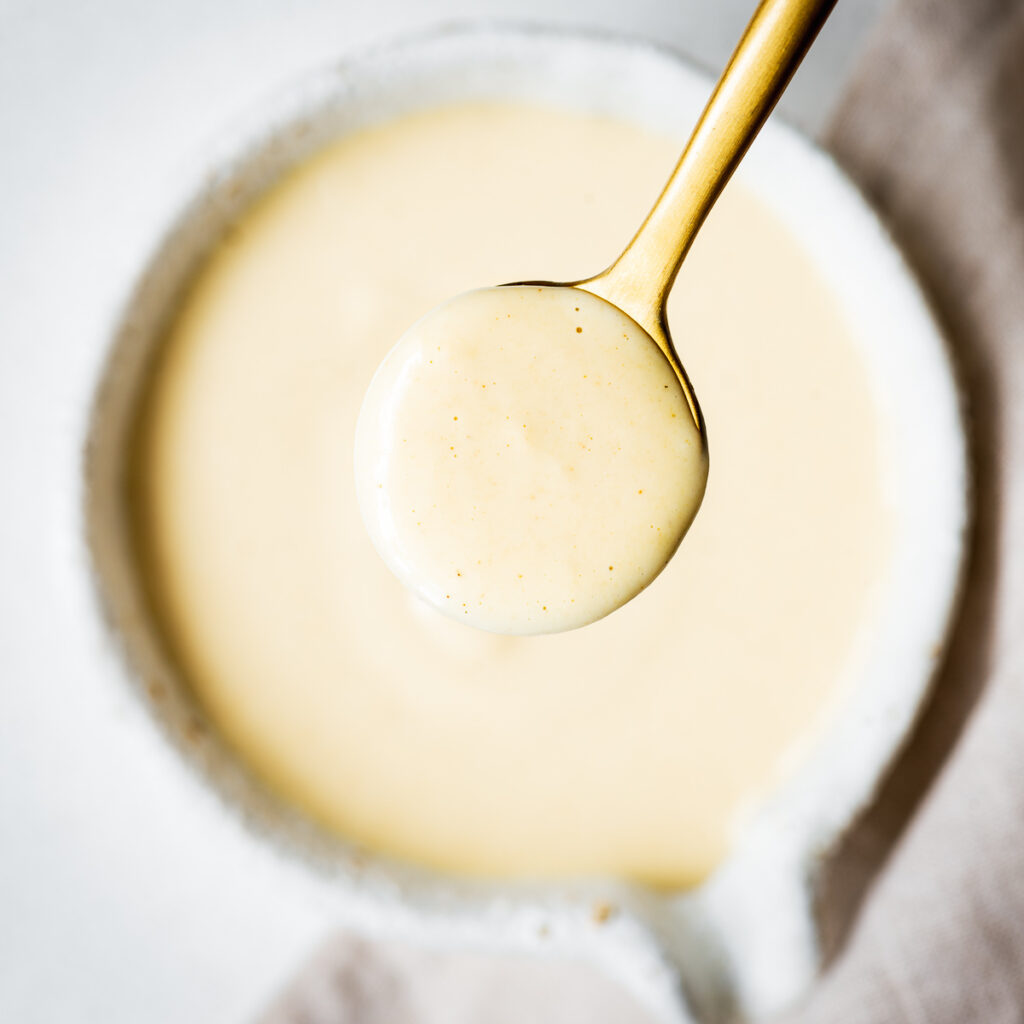
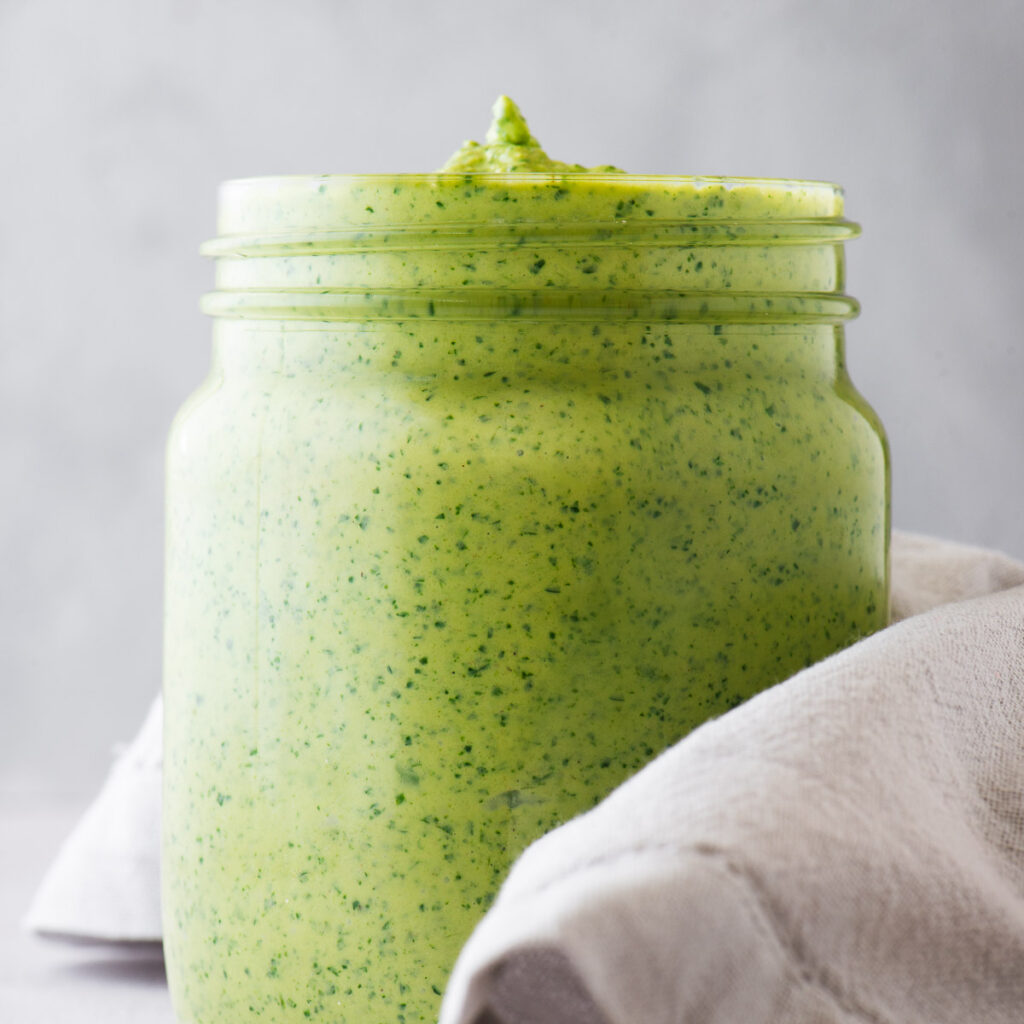
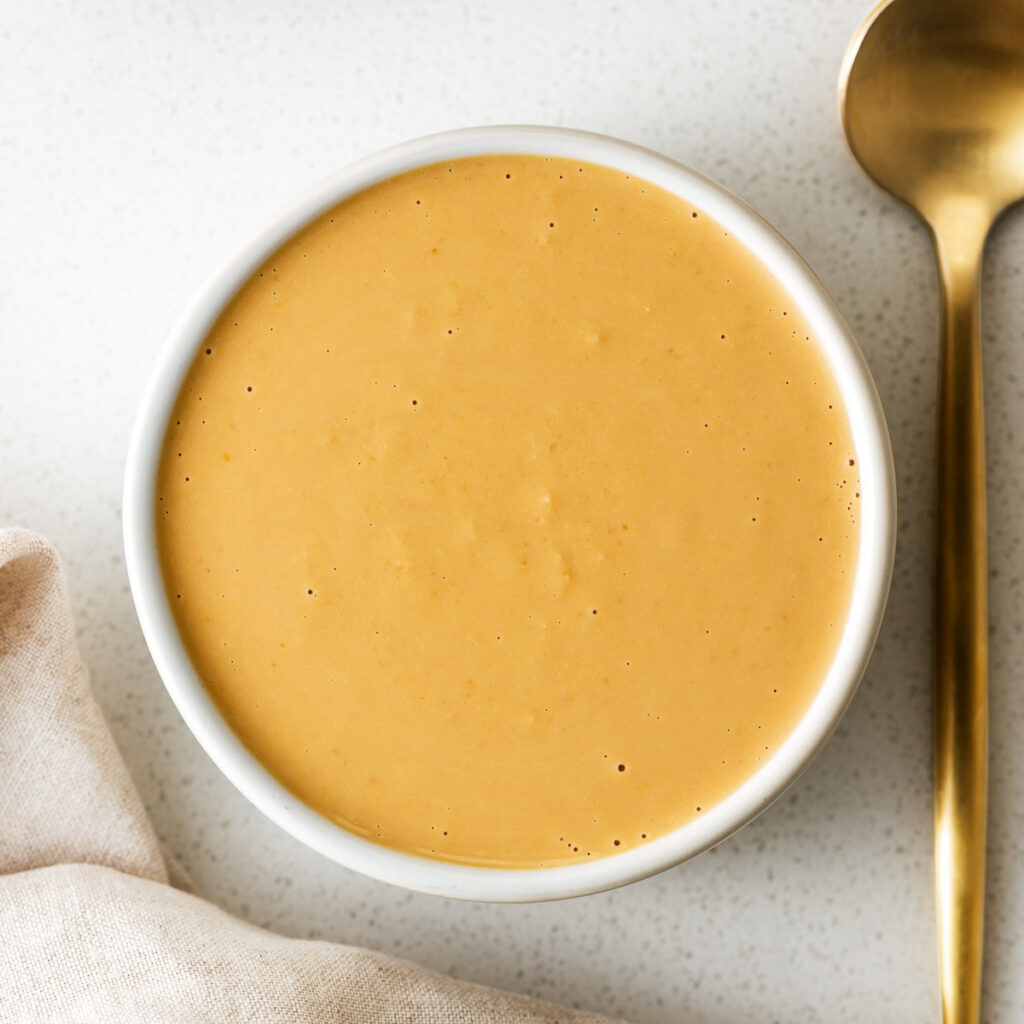
It was so simple to make and added a delicious tangy flavor to my dishes. I also tried the variations with garlic and herbs, and they were equally fantastic.
I’m so happy you enjoyed the tahini sauce, Gianne!
This sauce is creamy and delicious. I love to drizzle it over broccoli and Brussels sprouts.
Ooooh yes! I adore broccoli and tahini, it’s such a great combination. And I’m definitely going to try it with Brussels sprouts (I’m a fan)!
I’ve never tried a lemon tahini sauce before and I am excited to give it a try. I love that I can use it as a dip, dressing or sauce for some of my favorite Mediterranean meat dishes.
Wonderful, Andrea! You won’t regret trying it! This is such a great sauce for any Mediterranean meal!
This is a well-balanced sauce with the ratio of salt, lemon and garlic with the tahini.
Works well with mezze platter, dipping vegies and even grilled beef steak.
Thank you so much, Jan! I’m glad you tried the recipe! And I agree, it’s my favourite to serve with a mezze platter!
This lemon tahini sauce was absolutely delicious. I know I’ll be making it again and again for my wraps.
Thank you so much, Paula! I’ve never tried it in a wrap before, I’m definitely doing that today!
Such a perfect post, I love lemon tahini sauce, especially with falafel! I’m going to try your recipe today!
Yay! Let me know how it goes!
made as directed but unfortunately I didn’t take prior to adding the salt and just followed the recommendation. it was way too much salt, cut it in half of even a quarter.
Hi Rhonda,
I am sorry that the resulting tahini sauce was too salty for your purpose.
The 1 teaspoon of salt per cup of tahini is the same as Michael Slomonov’s authentic Israeli tahini sauce recipe (see Samin Nosrat’s adaptation of his basic tahini sauce recipe on NYT Cooking). His recommendation works well for me because I like my sauce to be seasoned well when I serve it with falafel or unsalted crudités.
But, unfortunately, different brands of salt are not equally salty. So, you can easily follow a recipe perfectly and still need to adjust the seasoning.
I will make the “taste and season with salt” sentence in the recipe card stand out more so that the tasting step is not so easily missed.
Thank you so much for taking the time to write your feedback. It helps so much to ensure that my recipes are easy to follow and successful in every kitchen (regardless of the brand of salt used). :-)